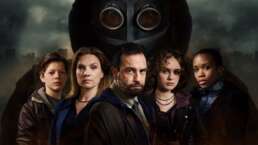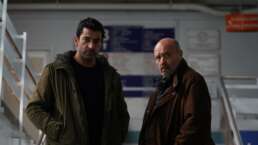Commissaire Maurice LaBrea (Francis Fulton-Smith) is the titular detective of this three-episode police drama based on German director, screenwriter and novelist Alexandra von Grote’s eponymous novels.
Alexandra von Grote’s LGBTQ+ aesthetic is delineated in her own scripted and directed WWII drama “Novembermond” (November Moon) depicting the forbidden love between a French Christian woman and her Jewish paramour, both trying to survive under the Nazi glare (1987 Frameline Award Winner). The film stars Christiane Millet, Gabriele Osburg, Daniele Delorme and Bruno Pradal.
In each episode, von Grote holds up a mirror to society reflecting and straddling key aspects of the “female gaze” and the “male gaze.” The first alters the objectified female image that goes beyond gender; yet represents women not only as subjects and spectators but also as characters, directors and producers of an artistic work by women sharing their lived experience as exemplified by von Grote and other filmmakers (Barbara Hammer, Christine Vachon, Margaret Cho) who prioritize emotions over actions, showing viewers how it feels to be the object of the gaze by the gazer – “I see you seeing me.” The “male gaze” – an inversion of the “female gaze” draws upon Hitchcock’s voyeurism and fetishism in “Rear Window” (1954) with the application of Freud’s psychoanalytical theories through camera angles, narrative techniques and props. The male film creator easily objectifies his heterosexual male character for both male and female viewers.
Von Grote provides a knowing subtext by creating a cop with a pronounced feminine sensitivity vis-à-vis his uber-masculine profession while under duress to solve murders quickly. Kommissar Maurice LaBrea (Francis Fulton-Smith) is a widowed cop with a precocious, pre-teen daughter, Jenny (Leonie Brill) who moves from Marseille to Paris after his wife’s murder.
Each 90-minute episode contains multiple storylines – ripped from the headlines – with predatory protagonists embedded in a persuasive plot. The serial killer (aka the Bloodfoot Killer) in Episode 1: The Beast of the Bastille (2008) is an asexual predator conforming to psychological typecasting, preferring to display his dead, naked female victims as butterflies on a bed exemplary of the “male gaze.”
Episode 2: Murder in Rue St. Lazarre (2009) is an homage to Hollywood’s ‘casting couch’ – a system also popular in other filmmaking capitals of the world. The director’s soft-focus lens moves in for close-ups of the male and female protagonists as reflections of both the “female and male gazes.”
Episode 3: Deadly Dreams in Montparnasse (2009) highlights the horrors of male predators using women as sex objects with the requisite visuals and dialogue providing gruesome details. The “male gazer” of women who return the gaze say, “I see you seeing me, and I will do something about it.”
Each episode comprises provocative plots as harbingers of complex and unsavory storylines sprinkled with the fusion of feminist tropes and psychological prototypes unfolding through a cinematic prism.
Directors Sigi Rothemund (Donna Leon’s Brunetti) and Dennis Satin along with screenwriters Alexandra von Grote, Jurgen Buscher and Thomas Stillerhead work with a top notch Franco-German production team in Paris as well as an exceptional German cast including Bruno Bruni, Valerie Niehaus, Michael Konig, Anja Knauer and Gudrun Landgrebe among others.
EDITOR’S NOTE: We happily discovered Dr. Pearl Brandwein while reviewing MHz Choice subscriber feedback on our programs and, after reading a half dozen or so of Dr. Brandwein’s insightful reviews, all of us here at MHz Choice had the same thought: We need to get the good doctor to write for us! Enjoy! -MHz Choice
Want to get MHz Choice Premiere announcements sent to your inbox?
Sign up for our free newsletter here!
MHz Choice is available in the U.S. & Canada. Free 7-day trial then $7.99/mo.
Subscribe at mhzchoice.com.





